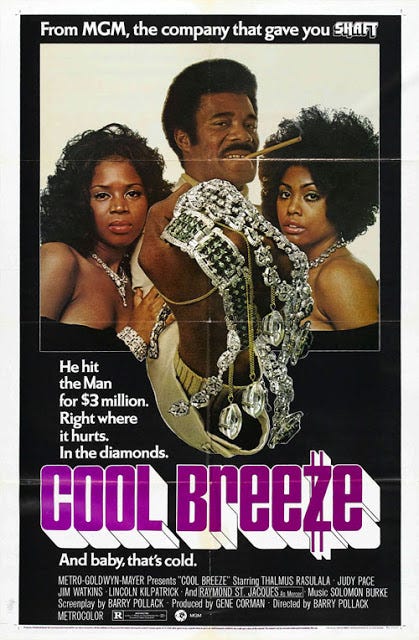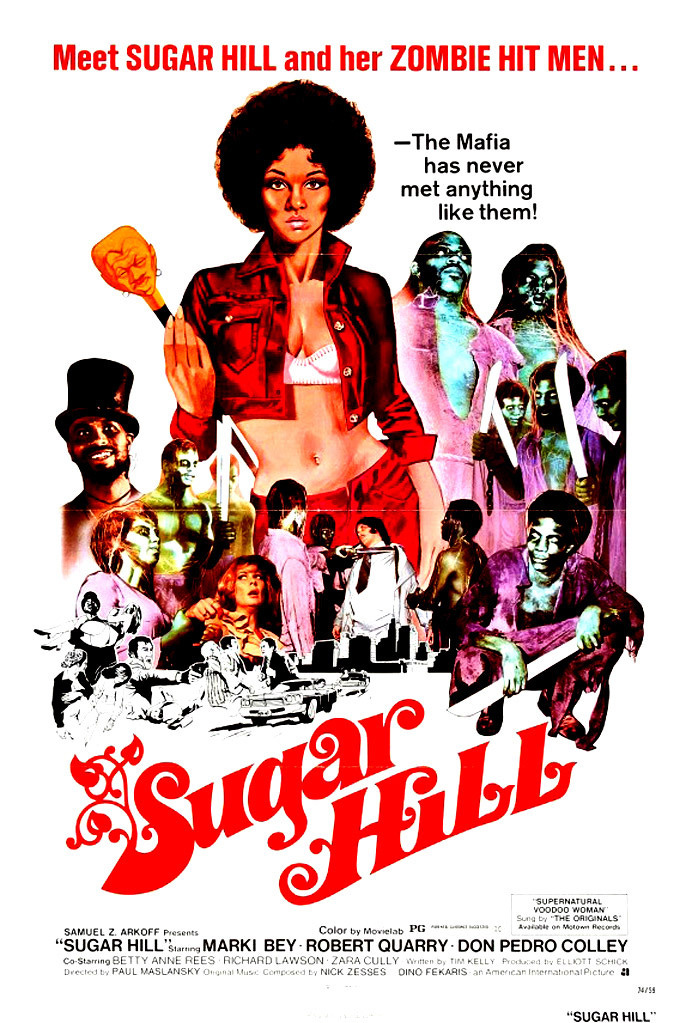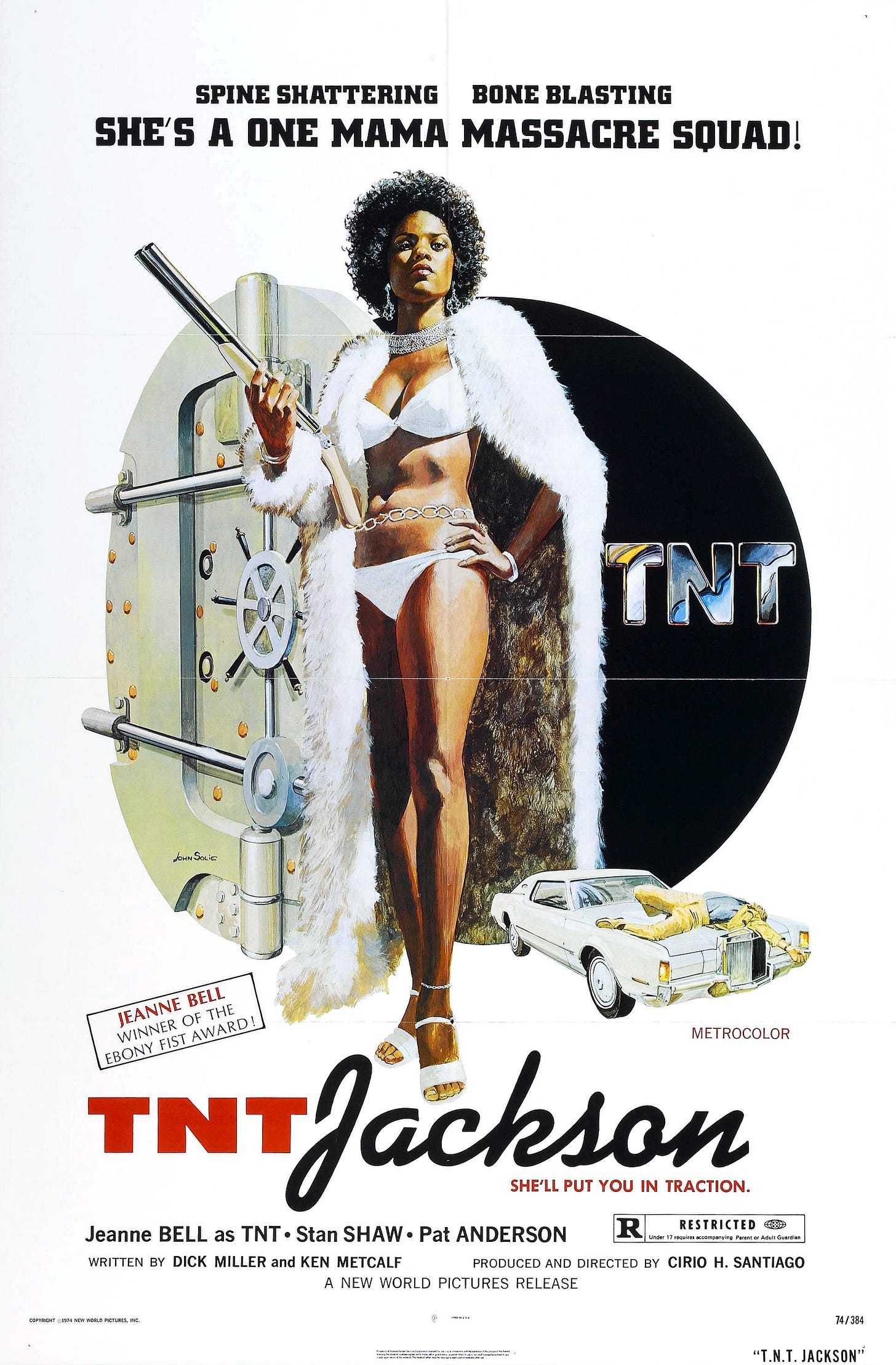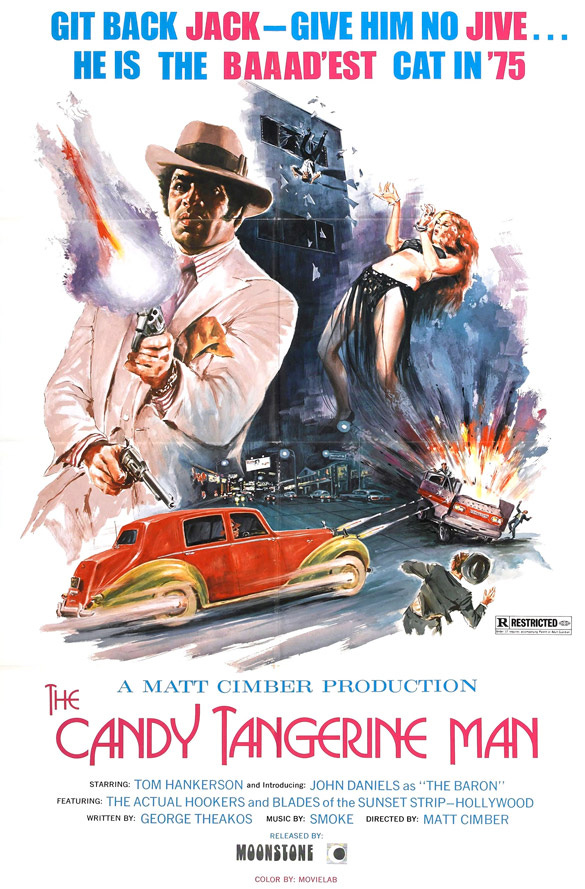The era of cool, bold, and sexy
Blaxploitation was more than just a genre—it was a cultural takeover. Where style met swagger, these films left a legacy that still drips with cool.
Happy Sunday Sha!
About a week or so ago I had a random inkling to watch Sugar Hill. I believe it was the ancestors whispering and pushing me in that direction, but if you are not a believer then you’d say it was something else. Anyhow, Sugar Hill is a Blaxploitation film that came out in 1974, it’s about a woman named Sugar Hill that uses Vodou to get revenge on gangsters that killed her boyfriend. In the movie her mother is a Vodou Priestess and they summon Baron Samedi, whom is a Haitian Voudou Lwa. With the intention of using his undead to help Sugar exact revenge on the jive turkeys that killed her man (hehe). Now, I absolutely stay in my feelings about depictions of Voudou and the mockery folks make of it, because why don’t people have this energy about Christianity? I'll keep my opinions on that to myself, I’m not here to give a lesson on Voudou or other African Traditional Religions (ATRs). While writing this it still baffles me how white people manage to colonize zombies of all things! Chile, that’s crazy.
But anyhow, for me, Sugar Hill is the first Blaxploitation movie I’ve ever seen, and if you’ve been reading then you know why, say it with me “MY GRAMPIE!” aka the greatest man in the world, of course introduced me to Blaxploitation… and Issac Hayes, who is a well known figure from the era. Real quick: When I was in college at Gram, my grampie would drive me back and forth from the backwoods to the backerwoods (lawd because Grambling is located in STRAIGHT COUNTRY), my grampie liked to joke and say that it was good that I went to school there, because there was nothing to do but study, and while I did study, and get great grades and honors, I absolutely had fun!). My bad, so I was saying, one time he was bringing me back to school and he played ONE Issac Hayes CD the entire ride, baby the ride was 4 hours and that CD didn’t loop not one time! There were maybe 5 songs on the CD? My goodness, every song felt like it was at least 45 minutes long. Now, I can appreciate the greatness that is the iconic Mr. Hayes (I even listen to a few songs on my own) but at that time? I was over it!
Okay okay, I love to reminisce but we’re here to chat about Blaxploitation films, music, culture, and its everlasting impact. Like I’d mentioned previously, I was first introduced to the genre while watching Sugar Hill with my grampie as a child. Now for those who aren’t familiar with Blaxploitation well, get ya some tea and let’s chat. There was a time in Hollywood where Black folks weren’t fighting for a place in Hollywood - they were demanding it, baby it was an entire movement! The 1970s came through, and so did a new era of movies where Black heroes weren’t in the backseat anymore. They took the wheel, drove the car, and weren’t stopping for nobody. Amen!
But of course, there’s always more to the story. So let's dive into what made Blaxploitation so iconic—and a little complicated too.
So Blaxploitation is a mix of “Black” and “exploitation,” and that’s where some folks had their issues. Hollywood wasn’t exactly known for giving us our flowers, and when they saw that Black folks were spending money at the movies, they figured they’d cash in on our culture. But instead of getting pushed around, we flipped the script.
Rightfully so, Black folks were tired of being sidekicks, maids, or villains in every other movie. So, when Hollywood gave us an inch we took a mile chile. These films gave us something we hadn’t had on the big screen before—Black leads who weren’t just surviving, but thriving. These heroes were bold, tough, and looked absolutely delicious. We were standing up to corrupt cops, taking down gangsters and did it all with that God given swag that seemingly every Black child is born with.
Sure, there were drugs, violence, crime—it was all in there. But there was also power in it. These characters weren’t perfect, but they were ours.
Now, if you follow Sunday Brunch on social media and are an active participant in the newsletter, you would have caught the interview I posted featuring Richard Roundtree (RIP). Babayyy that man, whew. Roundtree burst onto the scene with what we know today as the original Shaft (1971). Chile he came through with that leather trench coat, that smooth walk, and eyes that said, “I dare you to cross me.” And you better believe folks weren’t about to mess with him.
John Shaft wasn’t just another detective. No ma’am, he was a symbol. He wasn’t running from nobody, especially not “the Man.” Shaft was the kind of character who knew exactly who he was, and Richard Roundtree made sure we felt every ounce of that cool confidence. That character became a legend and that Isaac Hayes soundtrack? Don’t get me started. That was the cherry on top. To this day, that music still hits, and you know you’ve caught yourself singing “Who’s the Black private dick that’s a sex machine to all the chicks?” Yeah, you know the one.
Shaft wasn’t here to ask for permission, baby. He was takin’ what was his.
Now let me give a little love to my girl, Pam Grier. If Shaft was the king, Pam was the queen—and trust me, she ruled. This woman was everything we needed in the ’70s. She wasn’t just playing the tough girl; she was the tough girl. Her roles in Coffy and Foxy Brown? Baby, she was serving up looks and vengeance like nobody’s business. Pam Grier wasn’t waiting on a man to save her, she was the one doing the saving and looking damn good while doing it.
Pam brought a certain kind of fire that Hollywood wasn’t ready for. She was fierce, smart, and she didn’t just show up to play, she came to win. And you better believe, we were cheering her on the whole way. Foxy Brown was iconic, and Pam’s power in that role wasn’t just about looking good, it was about showing the world that Black women were not just “strong” but STRONG (and sexy!) and we didn’t need anyone’s permission to show it.
But baby, we wouldn’t even be talking about Blaxploitation if it wasn’t for Melvin Van Peebles. This man wasn’t waiting for anyone to give him a shot he went and took it. Back in 1971, he dropped Sweet Sweetback’s Baadasssss Song, and y’all, it was something else. The film was raw, gritty, and had folks clutching their pearls. It was about a Black man on the run from the law, but it wasn’t just a crime story it was a revolution in motion.
Van Peebles didn’t just make a movie. He broke the rules and gave Hollywood the side-eye while he did it. The film was rough around the edges, but that’s exactly what made it special. It was honest. It was Black. And it made a ton of money, proving that our stories could be just as powerful and profitable as anybody else’s. I mean, we are the originators!
Melvin said, “You won’t let me in? Fine, I’ll build my own damn house.” And that’s exactly what he did.
Now let me tell you, the soundtracks to these movies? Honey, they made the films. Curtis Mayfield on Super Fly? Isaac Hayes on Shaft? These weren’t just songs playing in the background; they were the soul of the story. The music told you everything you needed to know whether it was Mayfield’s smooth, cool crooning or Hayes’ funky beats, it all just fit.
These songs didn’t sugarcoat anything. They were real, raw, and hit on exactly what was going on in the streets. It wasn’t pretty, but it was honest, and that’s what made the soundtracks so powerful. You could feel it in your bones. Even today, when you hear those songs, they take you right back to that time. They’re timeless, suge. Timeless.
And now, let’s talk about the style, because one thing Black folks know is style, and we absolutely saw it here. Blaxploitation didn’t just give us movies, it gave us looks. Those wide collars, leather coats, the platforms whew. It was all about showing up, standing out, and making sure the world saw you. Black folks on screen weren’t blending in, they were turning heads, and every single outfit was a statement.
Big afros, bold colors, confidence and sex appeal? That’s what made it unforgettable. The style wasn’t just about clothes, it was about pride. It was about saying, “Yeah, I’m here, I look good AND I can take your woman/man”.
Now of course you can have massive success without somebody and their mother just hating. Some folks, especially in the Black community, weren’t feeling how these movies leaned into the violence and the drugs. They thought Hollywood was pushing out these wild stories just to profit off of us. And they weren’t exactly wrong.
By the time the late ’70s rolled around, Blaxploitation started to fade. Hollywood had milked the genre for all it was worth, and audiences were ready for something different. But don’t get it twisted, the impact didn’t just disappear.
The influence of Blaxploitation is still all over today’s culture. From Tarantino putting Pam Grier front and center in Jackie Brown to Beyoncé channeling Foxy Brown vibes in her videos. Even today’s movies like Undercover Brother and Black Dynamite. Allegedly , “They Cloned Tyrone” on Netflix is considered Blaxploitation and although it’s a very very good movie, I just don't see it. Regardless, Blaxploitation’s style and energy never left us. It wasn’t just about the movies. It was about creating a space where Black folks could be powerful, fearless, and, most importantly, seen. And that’s something we’ll always hold onto.
So the next time you hear that funky bassline or see somebody rockin’ that leather trench, just remember it all started. I love you darlin, and I’ll see you next time!











